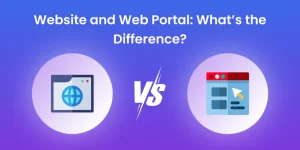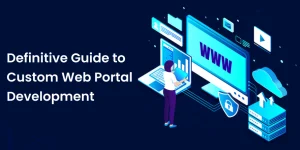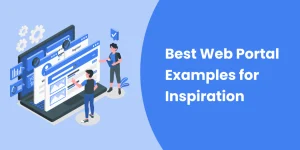What is a Web Portal? Definition, Types, and Benefits

These days, you might hear the term “web portal” quite often, but not everyone knows what it really means. Whether you’re shopping online, using your company’s internal website, or keeping up with local news, you’re likely already using some kind of web portal.
So, what exactly is a web portal? This article will explain what it is, the different types, and what are the Benefits of web portals.
Think of it like visiting a big shopping mall. Instead of wandering around, you get a map showing all the stores, food courts, and services available. A web portal works in a similar way, it helps you find the information or services you need online and guides you on how to access them.
Web portals are part of our everyday lives, helping us with things like online shopping, learning, government services, and staying connected on social media. They make it easy to access different tools and information in one place. This blog will help you understand web portals in a clear and simple way, So let’s get started.
What is a Web Portal
A web portal is a special type of website that serves as a centralized access point for information, tools, and services. It acts as a digital hub, bringing together content from multiple sources and presenting it in an organized, user-friendly way.
Unlike a standard website that focuses on static information, a web portal is interactive and personalized, allowing users to access various applications, documents, and data in one secure location. It integrates information from different systems or databases to deliver a unified experience for each user.
In simpler terms, a web portal helps businesses and organizations offer users a single platform to log in, view relevant content, and use built-in tools like dashboards, notifications, and calendars.
To better understand how a web portal differs from a traditional website, you can explore our detailed guide on Web Portal vs Website, which covers the differences, advantages, and best use cases.
The demand for web portals is growing rapidly. The global web portal market is projected to reach $25 billion by 2031, growing at an annual rate of 8.75% from 2024 to 2031, as more companies adopt portals to improve accessibility, collaboration, and customer experience.
Here are some key features that define a web portal:
- User Login: Enables users to securely sign in and receive a personalized experience.
- Centralized Information: Collects and displays data from multiple sources in one dashboard.
- Customization: Allows users to tailor their view based on their needs and preferences.
- Built-in Tools: Includes features like messaging, notifications, and calendars to enhance usability.
Have a Web Portal Development Idea In Mind?
Share Your Unique Idea with Us, and Start Developing with Our
Experienced Team of Developers
Different Types of Web Portals
In this section, we will explore the different types of web portals available today. Each type serves a specific purpose and caters to different user needs, enhancing access to information and resources. Let’s take a closer look at these various categories and understand how they function.
If you’re building a web portal for your business idea, you might want to explore the best web portal examples to get inspiration for your project.

Customer Web Portals
Customer portals are built to give customers automated access to information and services related to a company or organization. They allow customers to manage their accounts, track orders, find support resources, and access important documentation in one place.
Providing a dedicated space for customer interaction can greatly improve the customer experience.
Such portals typically provide help desk systems for support ticket requests, FAQs, product documentation, and account management. Empowering customers to solve problems themselves and giving them access to information in real-time enhances customer satisfaction while relieving pressure from customer service teams.
Zendesk: A customer service platform that provides businesses with a portal for users to submit support requests, access articles in a knowledge base, and track their ticket status.
Salesforce Customer 360: This portal’s user-friendly interface allows customers to access their account information, view order history, and communicate with support teams.
Information Web Portals
Information portals serve as a one-stop comprehensive source for information on specific topics or industries. This is where they combine data from multiple resources and provide users with news, research, documents , and much more.
Information portals are of particular importance in fields such as education, research, and healthcare, where front-line stakeholders often require access to vast quantities of curated data.
Information portals are created to share knowledge and empower users to make informed decisions. Search functionality, filtering options, and content categorization are often features of information portals that assist users in quickly locating the information they are looking for.
Google Scholar: An academic search engine that provides a vast database of scholarly articles, theses, books, and conference papers, making it easier for researchers to find relevant literature.
PubMed: A web portal that offers access to a comprehensive database of the biomedical literature, providing users with research articles, reviews, and clinical studies in the health and medicine fields.
HR Web Portals
HR portals are dedicated systems for human resources teams in organizations. These portals facilitate HR management by streamlining functions such as recruitment, onboarding, payroll, performance management, and employee self-service.
Centralizing these functions in a digital platform, HR portals boost operational efficiency and improve the employee experience.
HR portals give employees access to important information such as company policies, benefit information, and training resources. These processes streamline HR operations and provide employees with a self-service portal to update personal details, request leave, and engage in performance evaluations.
WorkdayA leading HR management platform that offers a comprehensive portal for employees to access HR services, manage benefits, and view pay stubs.
BambooHR: An HR management tool for small and medium-sized businesses that provides an employee portal for managing personal information, time-off requests, and performance feedback.
B2B Web Portals
Business-to-business (B2B) portals are online platforms that enable transactions, collaboration, and communication between businesses. They simplify the buying and selling processes, enabling businesses to handle supply chains, purchase orders, and product catalogs efficiently. B2B portals streamline procurement and selling, keeping businesses running like clockwork.
These portals typically provide features like order tracking, invoicing, and payment processing, designed specifically for business-to-business interactions. These portals enable strong ties between partners and suppliers by introducing a dedicated shopping ground for B2B transactions.
Alibaba:A global B2B marketplace connecting manufacturers and wholesales with buyers, providing a platform for bulk purchasing and supplier engagement.
ThomasNet:: ThomasNet is an online resource for finding suppliers and manufacturers in North America. This B2B portal helps businesses streamline their procurement process by efficiently connecting them with potential partners.
Corporate Web Portals
Corporate portals are meant to control employees’ inner knowledge and promote interaction. Knowledge management systems are centralized platforms where critical resources, company policies, project management tools, and communication channels can be stored.
A corporate portal can create one web application tailored to these rather than an intranet full of links. This streamlines productivity by providing quick access to a variety of applications and services.
It ensures that employees have the necessary information available to them by providing authentication systems that allow for personalized access. This allows employees to tailor their experience and see resources that are most applicable to them in their organization.
These may include dashboards that summarize key metrics, notifications of changes or updates, and direct links to relevant documents, which can help teams work well together.
Microsoft SharePoint:A platform often used by enterprises to share documents, collaborate on projects, and streamline workflows. Employees can access a variety of resources, including company policies, training materials, and team discussions, all in one place.
SAP Enterprise Portal: This portal integrates business operations and allows employees to access tools and applications relevant to their roles. It is used primarily in larger enterprises.
eCommerce Web Portals
eCommerce sites enable shopping and a portfolio of products and services. These platforms enable users to scan, compare, and buy products without any hassle, making the online shopping experience as seamless as it can get.
To facilitate the purchasing process, they include dozens of payment and shipping methods, making sure that users do not face any issues while transacting. They not only provide a large marketplace, but they also leverage complex algorithms that improve the experience for users.
For example, they will recommend products based on your browsing history, reviews, and preferences, which helps make shopping more user-friendly and efficient. They can also offer features like customer reviews, wish lists, and promotional discounts, all of which can help foster customer engagement and loyalty.
Amazon:A leading eCommerce portal where users can find millions of products, read reviews, and make purchases all on one site. Amazon’s recommendation system also personalizes the shopping experience for each user.
eBay: An online auction platform that allows users to buy and sell items. The portal includes features for bidding, feedback from buyers and sellers, and various product categories.
Community Web Portals
Community portals provide a platform for users with shared interests to connect, discuss, and collaborate. Web portals are online meeting grounds for people to discuss, share, and post content relevant to their interests and/or hobbies. Community portals also help users create bonds with others with similar interests.
These portals generally include features like user profiles, discussion forums, blogs, and multimedia-sharing capabilities. There are different ways members can engage, from written posts to videos to images. However, community portals tend to have content generated by users, meaning the richness of the site is dependent on member contributions and interactions.
Reddit: A vast community portal where users can join various subreddits based on their interests, share content, engage in discussions, and upvote or downvote contributions.
Facebook Groups: Part of Facebook’s social networking service, groups allow users to connect and share information on topics ranging from hobbies to professional interests.
Government Web Portals
These government portals are specifically designed to help citizens access government services and information more efficiently. By providing key services in a single place, these platforms seek to streamline interactions between citizens and government agencies. They also foster transparency, accountability, and public confidence in government institutions.
Common functions found on such portals include self-service options that enable citizens to perform actions online, such as filing taxes, obtaining permits, or signing up for public records. Therefore, they minimize the need to visit a government office in person. Government portals might also provide citizens with access to educational resources, news updates, and contact details for various services.
USA.gov: It is the U.S. government’s official web portal. It provides citizens with access to federal services, information on government programs, and resources for finding local services.
Gov. UK: The UK government’s online platform allows citizens to find services, pay their taxes, and access important public information in a clear and organized manner.
Educational Web Portals
Educational portals, usually designed for use in academic environments, provide students and faculty with the resources and communication needed for the learning process. They offer a single point of entry for students to access course materials, academic support services, and administrative resources.
Educational portals are a continuing need in modern education, even for the use; they bridge the gap between learning and erase administrative headaches for students and faculty alike.
Portals provide central accounts for tools like discussion boards, assignment submissions, and even grade tracking. They give students a comprehensive overview of what they need to learn and what they have achieved. Teachers can also use these portals to connect with students and access certain teaching resources.
Moodle: An open-source learning platform that helps educators create online courses. Students can access course materials, participate in forums, and submit assignments through this portal.
Blackboard: :A widely used learning management system in universities, allowing students to access course content, grades, and communication tools with faculty and peers.
What Are the Benefits of Web Portals?
Now that we have discussed the different types of web portals, let’s examine their benefits, if you’re a business owner who’s looking to develop a web portal then understanding these benefits helps you plan your business plan.
Everything in One Place
Web portals aggregate information and services from diverse sources into one site, facilitating free access for users to relevant content without having users go to multiple sites.
For instance, corporate portals can collect HR resources, project management tools, and company news, minimizing the time employees spend searching for information.
Personalized Experience
Many web portals offer dashboard customization. This allows users to choose the content they want to be served next time, making it more relevant to them. A well-known example is an eCommerce portal that can recommend products based on what a user has bought in the past while still providing the user with unique experiences.
Save Time and Work Faster
Web portals combine different functionalities to provide users with convenience and save them time. By performing tasks faster instead of navigating other sites or interfaces, users can save time.
Government portals are used to streamline services, allowing citizens to file taxes, apply for permits, and access information without visiting several government offices.
Work Together Easily
These collaborative tools include shared documents, messaging systems, and discussion forums, among others, and they are often part of Web portals. An educational portal allows students to collaborate on group projects, exchange ideas, and communicate with instructors through one platform.
Enhanced User Engagement
Interactive tools such as discussion boards, polls, or surveys can increase engagement. In contrast, community portals enable users to engage in conversations, location experiences, and offer feedback, ultimately fostering a thriving online ecosystem.
Save Cost
Organizations can manage information and services using a web portal. Organizations can save on operational costs and usher services faster by removing dependency on multiple platforms and services.
Conclusion
First, web portals are widely used tools in the current interconnected world. They make it easier for people to access information and services, and connect with users. From students studying through educational resources to employees having to navigate their corporate data or citizens looking for government services, web portals have become an integral aspect of a simpler and coherent online experience.
To create a unique web portal solution, hire dedicated developers to survive and thrive. So what are you waiting for? Leverage our innate command over web portal development and ascend the digital maturity curve with ease.
Frequently Asked Questions
A web portal's main function is to provide users with a single point of access to a wide range of information, services, and applications.
Unlike regular websites, which serve a specific purpose or focus, a web portal gathers, manages, and links information from various sources and often caters to a specific user group.
Web portals can serve different groups of people, such as employees within an organization (corporate portals), students and teachers in learning (educational portals), customers shopping at eCommerce websites, and citizens accessing government services (gov portals). In essence, web portals are for everyone and require centralized access to information or services.
Security Measures: Web portals usually have measures in place to protect users' data and ensure the safety of transactions. These measures can include user authentication, data encryption, and secure payment gateways.
Yes, many web portals provide customizable selections based on user preferences. This may include changing settings to show their favorite type of content, building dashboards for specific applications, or setting alerts for things related to their interests.
Increase the effectiveness of information sharing across businesses through the use of web portals , and it plays a vital role in improving communication and collaboration, and thus can improve overall business operations significantly.





















